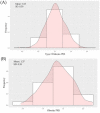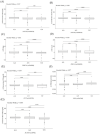Testing the Utility of Polygenic Risk Scores for Type 2 Diabetes and Obesity in Predicting Metabolic Changes in a Prediabetic Population: An Observational Study
- PMID: 36555722
- PMCID: PMC9787993
- DOI: 10.3390/ijms232416081
Testing the Utility of Polygenic Risk Scores for Type 2 Diabetes and Obesity in Predicting Metabolic Changes in a Prediabetic Population: An Observational Study
Abstract
Prediabetes is an intermediate state of hyperglycemia during which glycemic parameters are above normal levels but below the T2D threshold. T2D and its precursor prediabetes affect 6.28% and 7.3% of the world’s population, respectively. The main objective of this paper was to create and compare two polygenic risk scores (PRSs) versus changes over time (Δ) in metabolic parameters related to prediabetes and metabolic complications. The genetics of 446 prediabetic patients from the Polish Registry of Diabetes cohort were investigated. Seventeen metabolic parameters were measured and compared at baseline and after five years using statistical analysis. Subsequently, genetic polymorphisms present in patients were determined to build a T2D PRS (68 SNPs) and an obesity PRS (21 SNPs). Finally, the association among the two PRSs and the Δ of the metabolic traits was assessed. After a multiple linear regression with adjustment for age, sex, and BMI at a nominal significance of (p < 0.05) and adjustment for multiple testing, the T2D PRS was found to be positively associated with Δ fat mass (FM) (p = 0.025). The obesity PRS was positively associated with Δ FM (p = 0.023) and Δ 2 h glucose (p = 0.034). The comparison of genotype frequencies showed that AA genotype carriers of rs10838738 were significantly higher in Δ 2 h glucose and in Δ 2 h insulin. Our findings suggest that prediabetic individuals with a higher risk of developing T2D experience increased Δ FM, and those with a higher risk of obesity experience increased Δ FM and Δ two-hour postprandial glucose. The associations found in this research could be a powerful tool for identifying prediabetic individuals with an increased risk of developing T2D and obesity.
Keywords: genomics; obesity; polygenic risk scores; prediabetes; prediction; type 2 diabetes.
Conflict of interest statement
The authors declare no conflict of interest.
Figures


Similar articles
-
Circulating SFRP5 levels are elevated in drug-naïve recently diagnosed type 2 diabetic patients as compared with prediabetic subjects and controls.Diabetes Metab Res Rev. 2015 Feb;31(2):212-9. doi: 10.1002/dmrr.2599. Epub 2014 Oct 21. Diabetes Metab Res Rev. 2015. PMID: 25139699
-
Defining type 2 diabetes polygenic risk scores through colocalization and network-based clustering of metabolic trait genetic associations.Genome Med. 2024 Jan 10;16(1):10. doi: 10.1186/s13073-023-01255-7. Genome Med. 2024. PMID: 38200577 Free PMC article.
-
One-Hour Postload Hyperglycemia Confers Higher Risk of Hepatic Steatosis to HbA1c-Defined Prediabetic Subjects.J Clin Endocrinol Metab. 2016 Nov;101(11):4030-4038. doi: 10.1210/jc.2016-1856. Epub 2016 Jul 26. J Clin Endocrinol Metab. 2016. PMID: 27459528
-
Assessing the performance of European-derived cardiometabolic polygenic risk scores in South-Asians and their interplay with family history.BMC Med Genomics. 2023 Jul 12;16(1):164. doi: 10.1186/s12920-023-01598-5. BMC Med Genomics. 2023. PMID: 37438803 Free PMC article.
-
Associations of vitamin D with insulin resistance, obesity, type 2 diabetes, and metabolic syndrome.J Steroid Biochem Mol Biol. 2018 Jan;175:177-189. doi: 10.1016/j.jsbmb.2016.09.017. Epub 2016 Sep 20. J Steroid Biochem Mol Biol. 2018. PMID: 27662816 Review.
Cited by
-
Associations between polygenic risk scores for cardiometabolic phenotypes and adolescent depression and body dissatisfaction.Pediatr Res. 2024 Dec;96(7):1853-1860. doi: 10.1038/s41390-024-03323-z. Epub 2024 Jun 15. Pediatr Res. 2024. PMID: 38879627
-
Titania nanotubes with aminated reduced graphene oxide as efficient photocatalysts for antibacterial application under visible light.Sci Rep. 2025 Feb 19;15(1):6127. doi: 10.1038/s41598-025-90270-2. Sci Rep. 2025. PMID: 39971972 Free PMC article.
References
Publication types
MeSH terms
Substances
LinkOut - more resources
Full Text Sources
Medical

